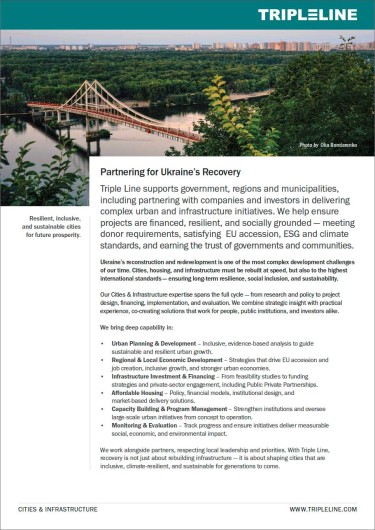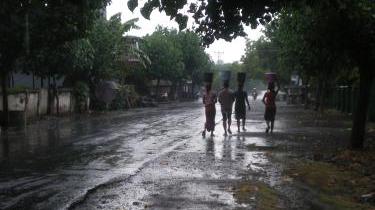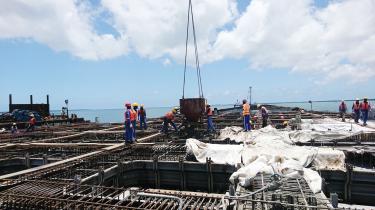Restoring Ukraine's cities, housing, and infrastructure involves more than just rapid reconstruction—recovery must be a transformative opportunity, anchored in the future with resilience, inclusion, and sustainability.
The core challenge lies in creating urban systems that will support prosperity, EU integration, and climate security for generations to come.
Reconstruction will place demands on every level of government, from municipalities to ministries. The difficulty is not just in financing and delivery, but in ensuring that all projects are socially grounded, climate-smart, and trusted by the communities they serve.
These interlocking priorities—housing displaced people with dignity, upgrading infrastructure to meet EU accession standards, and embedding resilience into every investment—will define Ukraine's future.
What experience tells us
Across fragile and post-conflict contexts, our work has shown us that recovery is most successful when infrastructure planning is people-centred, investment-ready, and institutionally grounded.
- Housing & displacement – For IFC, we developed housing solutions that moved beyond temporary camps, creating integrated, inclusive settlements that balance market delivery with social protection. These lessons are directly relevant to rehousing Ukraine's displaced populations with dignity and security.
- Climate finance & resilience – In Ethiopia and Indonesia, we designed affordable, nature-based urban investments backed by the Green Climate Fund and KOICA. Such replicable models — flood management, erosion control, urban forestry — can strengthen Ukraine's resilience against future climate shocks.
- Urban regeneration – In Vietnam, we helped the World Bank embed green infrastructure into city upgrading, building municipal capacity while delivering climate-smart growth. This approach is vital for Ukraine's renewal.
- Inclusion in infrastructure – For the World Bank, GIF and PPIAF, we advanced gender-inclusive approaches that improved sustainability and gained community acceptance. These principles can ensure Ukraine's recovery is equitable and widely supported.
Experience relevant to Ukraine
- Financing for resilience – Accessing climate finance and blending public–private investment will be crucial to scaling up recovery.
- Institutional strengthening – Capacity building at the municipal and regional levels will determine whether projects endure.
- Social inclusion – Infrastructure that reflects the needs of displaced, marginalised, and vulnerable groups will be more resilient and more legitimate.
- Integrated systems – Housing, transport, energy, and urban services must be planned as interconnected systems, not standalone projects.
A partner for Ukraine's recovery
Triple Line brings more than 25 years of experience in urban development, infrastructure finance, and housing solutions in contexts from Sub-Saharan Africa to Asia. Our expertise spans the full cycle — from diagnostics and planning to financing, implementation, and evaluation.
For Ukraine, this means recovery can be more than reconstruction: it can be the foundation of inclusive, climate-resilient cities for the future. That is the perspective we bring, and the spirit of partnership we aim to foster.
For further information, please download our Ukraine Cities & Infrastructure overview below, or contact Ricardo Pinto




